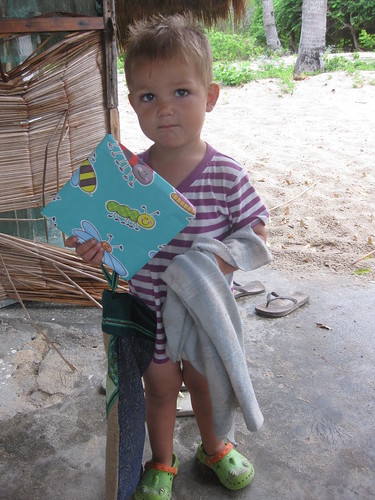Wednesday, 19 December 2012
Monday, 3 December 2012
Tuning into the sounds of Mozambique
This is just to say that we recently had an article published on the BMS World Mission website that tries to describe some of the drama of modern-day Mozambique. You can read it by clicking here or going to www.bmsworldmission.org and looking in the list of recent articles. Enjoy!
Wednesday, 7 November 2012
Tradition and responsibility: Life after death in Mozambique.
A few months ago, Mario’s (not his real name) father died. Although he was an old man for Mozambique (life expectancy is 421), the stroke was quite sudden. He was brought from his village to stay near the city not far from our house to be with his extended family, most of whom have migrated to Beira for work. In Beira he was also able to see a nurse2 but he never recovered and died about a week later.
The funeral took place on a Tuesday. A short service was held in a catholic church and he was buried in the cemetery. Back in the UK, we tend think about funerals as marking an end of a life, but in traditional Mozambican culture, the funeral is just the beginning of a series of ceremonies intended to help the safe passage of spirit of the deceased into the realm of the ancestors. The village shamans and healers play an important part in this. For example if the ceremonies are not done well enough, the spirit can turn malevolent, wreaking havoc on the family health, crops and livelihoods.
During one ceremony, the spirit chooses a family member to inhabit, joining the ancestors that live on after death in the living. Although not the eldest son, Mario was chosen to receive the spirit of his father, he said, because his father loved him the most. And with this honour came all the responsibilities due the new head of the family; no small deal for a young guy still studying.
We first noticed a change in Mario quite soon after his father’s death. He was less cheerful, less talkative and more sullen. We knew that he’d started turning up late for work but we put this all down to stress, mourning or the weight of extra responsibility.
 Then one day he nearly got fired. He’d turned up for work drunk and unable to do his job. In desperation he spoke to us about his problem. Everyone knew that in life his father had liked a beer on a Friday evening, but he told us that in death the spirit of his father was making him drink away every last metical of his small salary. He knew he was in trouble but how could he reject the spirit of his father?
Then one day he nearly got fired. He’d turned up for work drunk and unable to do his job. In desperation he spoke to us about his problem. Everyone knew that in life his father had liked a beer on a Friday evening, but he told us that in death the spirit of his father was making him drink away every last metical of his small salary. He knew he was in trouble but how could he reject the spirit of his father?Whatever you believe about this kind of thing, in Mozambique the physical and the spiritual are believed to be intractably interwoven in the fabric of everyday life. Every action taken in this world is watched, judged and acted on by those that inhabit the spiritual realm. The only way to overcome a problem in this world is to also overcome the spirits who are causing it in the other.
Whether you believe Mario’s experience is a genuine one, or just put it all down to psychology, he needs to find a way of getting out of this mess whilst feeling that he is honouring his father. But in this culture passages like 1 John 4 really come into their own.
Test the spirits, writes John. If they’re from God then they’ll acknowledge Jesus, if not they’re false and therefore liers. He tells his readers that because God is in them they can overcome the lying spirits and in a twist of logic he says now that they are from God and the spirits are from the world.
We believe that through Jesus, there is a way out that both saves Mario’s job and livelihood and honours the memory of his father. Please pray for him as he begins to study his bible and discover this wonderful truth.
1According to the United Nations, Mozambique has the second lowest life expectancy in the world:
http://www.un.org/esa/population/publications/wpp2006/WPP2006_Highlights_rev.pdf
2Access to rural healthcare is very poor. There is roughly 1 nurse per 5000 people and the vast majority are based in cities and towns:
http://www.nationsencyclopedia.com/WorldStats/HNP-nurses.html#map
Thursday, 25 October 2012
'Normal'
 As I was driving down the dual carriageway on my way into town the other week, I carefully avoided the motorbike driving at speed the wrong way and very much on the wrong side of the road. A few minutes later what surprised me was my lack of surprise. I realised how I had barely thought about the situation, let alone been shocked by the disregard for road safety laws. It got me thinking about all the things that have become ‘normal’ for us over the last few years. Here are just a few:
As I was driving down the dual carriageway on my way into town the other week, I carefully avoided the motorbike driving at speed the wrong way and very much on the wrong side of the road. A few minutes later what surprised me was my lack of surprise. I realised how I had barely thought about the situation, let alone been shocked by the disregard for road safety laws. It got me thinking about all the things that have become ‘normal’ for us over the last few years. Here are just a few:1. Pot holes in roads big enough to swallow a car.
2. Never ending sunshine... So much so that we often long for rain.
3. The sight of small children wandering unaccompanied along busy roads.
4. Watching an incredible amount of development, at a scary rate. For example when we arrived, Beira had one supermarket. It now has four with two of them opening up just the month gone buy.
5. Having people asking for money when you get out the car in certain zones in town.
 6. Seeing all types of vehicles, from bikes to large lorries, overloaded with all sorts of items, people, animals and machinery.
6. Seeing all types of vehicles, from bikes to large lorries, overloaded with all sorts of items, people, animals and machinery.7. Seeing the countryside alight as people set fire to the old season’s crop in preparation for the new.
8. Some ‘special’ clothing choices. My favourite being a man who was selling rugs at a local market dressed only in a dressing gown.
9. Neighbourhood monkeys, some wild, some kept as pets.
10. People offering to work for me as a nanny when I take the children with me shopping.
Wednesday, 10 October 2012
New prayer letter
 Our most recent prayer/news letter can now be found online on the BMS World Mission website. Click here to find it if you haven't read it yet! In this letter, Christine has tried to tell the story of the car accident in some detail, sharing how God has been at work through it all.
Our most recent prayer/news letter can now be found online on the BMS World Mission website. Click here to find it if you haven't read it yet! In this letter, Christine has tried to tell the story of the car accident in some detail, sharing how God has been at work through it all.
Monday, 10 September 2012
Six months in two pages
 |
| Jeremias with his family |
I’ve just looked to see when we last wrote a blog… I’m very embarrassed but not at all surprised! Since the last blog post our world has been a little shaken to say the least. But if I’m honest, I know I’ve been putting off writing about our life here as I’m still taking time to make sense of the country we live in and our recent experiences. Anyway I’ll do my best to fill in some of the details of the last few months.
I’m sure that many of you who follow us are aware that I (Christine) was involved in a car accident in April. Having driven for nine years without an accident it was pretty terrifying. As is so often the case here, while I was driving on a clear road with no car in front or behind me, a boy (Jeremias) of around nine years ran straight out into the car. Thankfully he is alive and despite serious injuries which originally looked fatal, he seems to be making a full recovery. This happened soon after our last blog post and affected a great portion of our time and lives afterwards.
 |
| Our language teacher at work |
At times we found the visiting and expectations very difficult to deal with especially in a society that says the driver of the car, whether at fault or not, has to provide for the injured party’s needs. I’m pleased to say that we have formed good friendships with Jeremias family, especially his father and that Jeremias is back near his home town on his way to a hopefully full recovery.
As part of the continued sorting out of the accident I was called to a tribunal up in Manica near the Zimbabwe border. We were reassured that this was just a regular procedure to formalise the expectations of the driver towards the injured party and their family. We received a letter telling us to be ready outside the courthouse at 9am and that failure to turn up could lead to a prison sentence! Knowing this we were nervous as to what to expect but safe in the knowledge that the proceedings, however intimidating, were to work out what the insurance company would pay out. Manica is a five hour drive from here but we decided that we could go and come back in a day so as not to have to ask a great deal of the babysitters who were looking after the children.
Leaving at 4am with a friend, Camica, who had kindly said she would translate for me we started out to Manica. The thick fog on the dark roads did not help my nerves but Camica, happily chatting away despite the hour, was a real blessing. We picked up Jeremias’ father and mother on the way and continued to the courthouse. Arriving early, we handed in our paperwork and waited to be called. Here I got a huge lesson in patience, a seven hour lesson to be precise. Eventually we were called. I think the Judge was as hungry for his lunch as we were by this time and didn’t even open the paperwork provided by ourselves and Jeremias’ family which explained what had happened. He assumed as with most motorists here that I had simply run away and had been caught by the police at a later date. Needless to say, proceedings did not go exactly smoothly: I was refused a translator, told I was a bad person, and then the case was thrown out as we needed to wait for a final report on Jeremias’ health which would be more likely to come along in January 2013. With the insurance company lawyer not even being given permission to speak we decided to go out for a late lunch all together. After a long day we drove back to Beira arriving to find the house still enshrouded in darkness from the longest power cut we’ve had since we’ve been here (over 48 hours). I can’t say it was one of the best days in my life but I was very thankful for all the friends and family both here and back in the UK who supported us with practical help, prayers and messages.
 |
| A cafe: the most important stop on a guided tour of Beira |
We have finally finished our formal language studies and are officially fluent in Portuguese at least if not in reality. We still make plenty of mistakes but can generally say what we need to say and understand what needs to be understood. As I’m still learning new words in English I’m sure our informal study of language will never end. We marked the finish of our language study with a visit from Geoff’s parents and my cousin, Jen. We took some well-earned holiday, showing them around Beira cafes as well as going to Savane Beach resort for a few days followed by a visit to Gorongosa National Park where we were privileged to see a lion as well as some elephants pretty close up.
The last few months have probably been some of the most trialling we’ve been through, however, as formal language is over it’s back to a slightly different type of work. I’m starting to visit some of the church pre-school program as Geoff starts looking at how to practise some of the basic farming techniques he has leant on a ‘Foundations for Farming’ course in order to help some orphanages in the local community provide their own food.
We’ll keep you updated with our progress.
Wednesday, 28 March 2012
A New House and Ancient Customs
 |
| Our new house |
Discovering that it’s actually cheaper to live in a $100 a night hotel than rent an average 4 bedroom house in good condition in the city, we’d begun to look in an informal residential area on the outskirts called Manga (literally meaning ‘mango’, I’d guess because there’s a lot of mango trees around). Manga has a very different feel to the city and here cultures new and old collide. People commute into the city on the minibus taxi service that run up and down the main tarmac road whilst at the same time filling their gardens with rice or maize to sell and eat.
It’s a beautiful area and we have a fantastic house with a garden full of fruit trees, bananas and vines. The only slight disadvantage of living here is that mains water is turned off each evening (we have plans to make our garden well water drinkable) and electricity is much more unreliable.
Although summer is slowly petering out, nights are still pretty hot and sticky so we all sleep in the blast of an electric fan. This overpowers much of the noise from outside, but during a power cut, the night noises reveal something of a hidden side to Mozambican life.
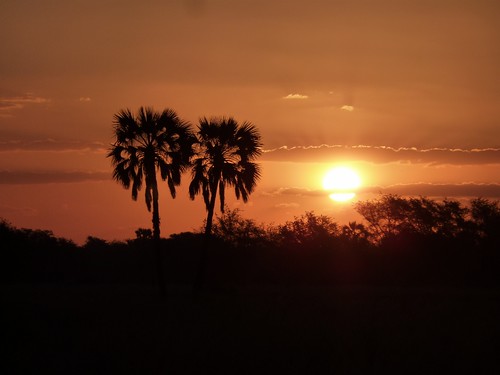 Without the fans and muted behind the screeching cacophony of crickets and frogs, we sometimes hear drums: fast flowing hypnotic and repetitive rhythms beating out into the dead of night. This is the sound of the Tradição (traditional beliefs) and the drums are one of the tools of the curandeiros (traditional healers) intent on calling a spirit into conversation. His (or her) plan is not to expel the spirit out of the person he is trying to help, we’re told, (after all, where would it go?) but to find out why it is angry and tormenting the person it is residing in, and discuss with it, in its own language, just how it might be appeased.
Without the fans and muted behind the screeching cacophony of crickets and frogs, we sometimes hear drums: fast flowing hypnotic and repetitive rhythms beating out into the dead of night. This is the sound of the Tradição (traditional beliefs) and the drums are one of the tools of the curandeiros (traditional healers) intent on calling a spirit into conversation. His (or her) plan is not to expel the spirit out of the person he is trying to help, we’re told, (after all, where would it go?) but to find out why it is angry and tormenting the person it is residing in, and discuss with it, in its own language, just how it might be appeased.The drums are just one aspect of the Traditição that is alive and strong in Mozambican culture. Any exploration around the base of a prominent old tree or termite mound may reveal fetishes (gifts given to the ancestral spirits that live there). These take the form of half buried clay pots that contain the ingredients of mysterious spells: chard cloth, bones, ash etc. This is the work of the fetiseiros (witch doctors); the charms are intended to bring illness, misfortune and even death to the unfortunate victim.
Mozambicans are a fantastically warm and friendly people, but if you scratch beneath the surface you'll find a deep undercurrent of very real fear. If someone does well for themselves, if their crops or goats do a little better, if they start to make money for themselves, they fear the possibility of being cursed for it by jealous neighbours.
The challenge for anyone working in development in Mozambique is that before you can have any conversation about improving the quality of local peoples’ lives, you first need to face this atmosphere of fear. We believe this can only be achieved by a loving God who is so much bigger than fear and jealousy.
Saturday, 24 March 2012
The British and the Weather
It’s been a very long time since our last blog post, but in that time we’ve moved house, passed level 2 Portuguese and had no less than three colleagues staying with us including the intrepid Brad and Ruth Biddulph (BMS Zimbabwe) and our first BMS Mozambique team member, Annet Ttendo. Geoff has travelled as far as Harare in search of a good answer to mulching maize and I (Christine) have discovered that, after days and days of ridiculously hot weather (i.e. a heat index over 50°C), I need a jumper on as soon as I go anywhere with air conditioning!
Well, this takes me nicely onto the theme of today’s post…
I thought when I left Britain that the standard conversations about the weather were firmly behind me. After all, what is there to discuss in a country where the weather apparently alters very little beyond day after day of glorious unbroken sunshine?
So you can imagine my disgust that nearly every day here in Mozambique there is some sort of discussion about the weather. What’s more, the weather is linked to everything: It’s the cold in winter (25°C) that means that you have a cold (of the runny nose variety). Of course, the summer heat causes the same. In winter, people cannot be found outside their houses because of the cold; in summer they’re at home resting because of the heat. And of course, you should all be warned of the dangers of wearing a red top in a thunderstorm (it’s fatal, you know!)
However, the ‘hot’ weather topic at the moment is no different from back in the UK: RAIN, RAIN, RAIN! Recent comments include: ‘It’s been too long since the last rain’ (the rains have been very late this year), ‘The amount of rain received is too small’ (i.e. it won’t help the crops), ‘The amount of rain received is too big’ (i.e. the dirt roads are flooded and cars keep getting stuck in mud).
After our last blog post, far too long ago I apologise, we are pleased to say that actually rain has at last started to arrive and just in time for some of the wilting rice in the fields. And so far not too much flooding! Yes, there is the occasional car stuck in mud but overall things aren’t too bad and I haven’t heard of people sleeping on their dining tables yet (which is what happens when houses flood properly.)
To finish I feel I must give a short update about the cyclone that affected people that live just a short way from Beira. We were delighted to hear that the local government had given some seed to affected areas near us and although the rains have been late this year I guess it means the late planting of crops was not as disastrous as it could have been. We thank God for the way in which people have begun to rebuild their lives.
I think that is enough weather talk for now. So what is the weather like there? Is it spring yet?
P.S. Brad and Ruth’s most recent blog post says a little about our life in Beira, if you’re interested, you can find it by clicking here.
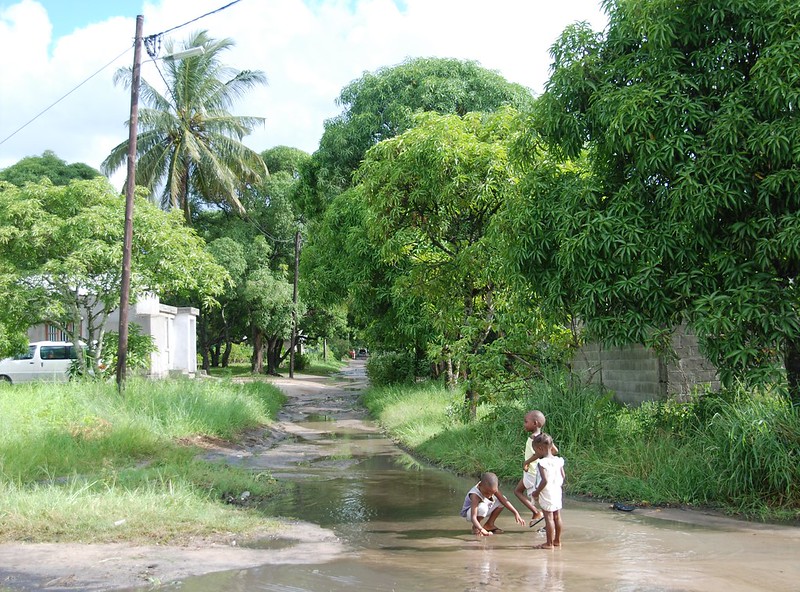 |
| Neighbours' children playing after the rain |
Well, this takes me nicely onto the theme of today’s post…
I thought when I left Britain that the standard conversations about the weather were firmly behind me. After all, what is there to discuss in a country where the weather apparently alters very little beyond day after day of glorious unbroken sunshine?
So you can imagine my disgust that nearly every day here in Mozambique there is some sort of discussion about the weather. What’s more, the weather is linked to everything: It’s the cold in winter (25°C) that means that you have a cold (of the runny nose variety). Of course, the summer heat causes the same. In winter, people cannot be found outside their houses because of the cold; in summer they’re at home resting because of the heat. And of course, you should all be warned of the dangers of wearing a red top in a thunderstorm (it’s fatal, you know!)
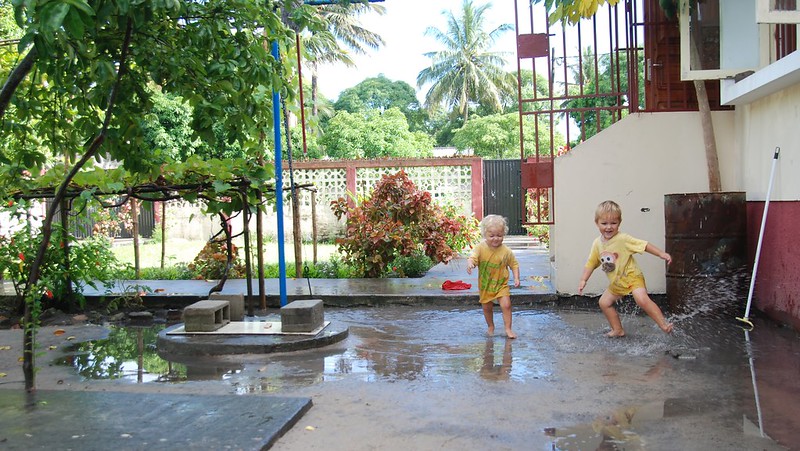 |
| Our kids have the same idea! |
After our last blog post, far too long ago I apologise, we are pleased to say that actually rain has at last started to arrive and just in time for some of the wilting rice in the fields. And so far not too much flooding! Yes, there is the occasional car stuck in mud but overall things aren’t too bad and I haven’t heard of people sleeping on their dining tables yet (which is what happens when houses flood properly.)
To finish I feel I must give a short update about the cyclone that affected people that live just a short way from Beira. We were delighted to hear that the local government had given some seed to affected areas near us and although the rains have been late this year I guess it means the late planting of crops was not as disastrous as it could have been. We thank God for the way in which people have begun to rebuild their lives.
I think that is enough weather talk for now. So what is the weather like there? Is it spring yet?
P.S. Brad and Ruth’s most recent blog post says a little about our life in Beira, if you’re interested, you can find it by clicking here.
Wednesday, 25 January 2012
Tropical Storm Hits Mozambique
 Greetings again from a hot and humid Mozambique. We know that most of you who read and follow our blog live in the Northern Hemisphere and, as your winter drags on, might find yourselves slightly envious of our summer heat. But it’s not all glorious sunshine here. There had been no sign of the rains (which normally start in November) and everyone has been waiting with bated breath for a break in the sweltering heat and some cooling water for their crops. That is until last weekend.
Greetings again from a hot and humid Mozambique. We know that most of you who read and follow our blog live in the Northern Hemisphere and, as your winter drags on, might find yourselves slightly envious of our summer heat. But it’s not all glorious sunshine here. There had been no sign of the rains (which normally start in November) and everyone has been waiting with bated breath for a break in the sweltering heat and some cooling water for their crops. That is until last weekend.
| Today's satelite image of the storm (NASA from wunderground.com) |
As the storm skipped past us further out to sea on Sunday night (we were up trying to comfort Isaac as thunder crashed overhead) it was little more than an inconvenient sleepless night. Please pray for our partners, the Convenção Baptista de Moçambique who are currently planning how best to help those who have been left homeless and cropless just the other side of the nearby River Pungue.
Tuesday, 3 January 2012
A Post Christmas Blog Post
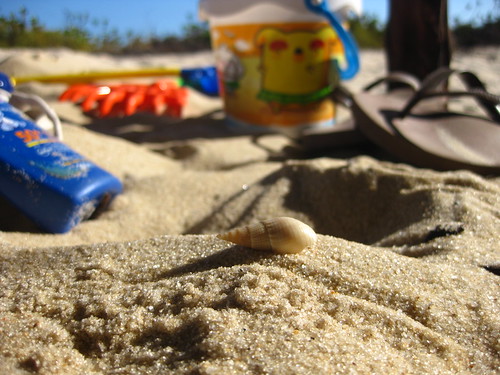 |
| Christmas, Southern Hemisphere style! |
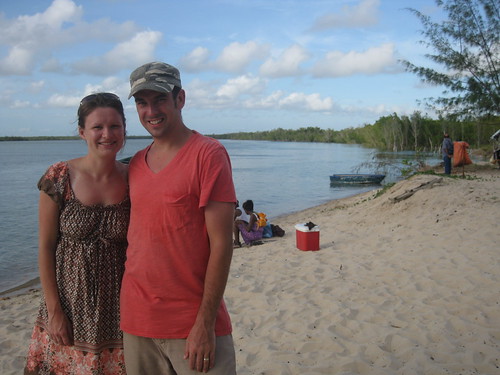 We had decided that to avoid too much homesickness we would get together for the Christmas period with our friends and BMS colleagues Brad and Ruth Biddulph who are based in Zimbabwe (click here to find their blog). After Naomi left the clinic we agreed that a night away from Beira was definitely in order, so on Christmas Eve we packed up a few bits and headed off to the local beach resort of Rio Savane where we booked to stay for one night. Although none of us felt particularly Christmassy, Ruth and I sang cheesy Christmas songs as we bumped down the dirt road in an attempt to invoke a sense of the season… I think we managed to invoke several headaches instead.
We had decided that to avoid too much homesickness we would get together for the Christmas period with our friends and BMS colleagues Brad and Ruth Biddulph who are based in Zimbabwe (click here to find their blog). After Naomi left the clinic we agreed that a night away from Beira was definitely in order, so on Christmas Eve we packed up a few bits and headed off to the local beach resort of Rio Savane where we booked to stay for one night. Although none of us felt particularly Christmassy, Ruth and I sang cheesy Christmas songs as we bumped down the dirt road in an attempt to invoke a sense of the season… I think we managed to invoke several headaches instead.We were staying in a basic thatched ‘cabana’ which consisted of low walls, a thatched roof, a cement floor, a little mosquito netting and a BBQ outside. Shortly after arrival Geoff set about our first ‘braai’ of holiday season: sausages, burgers and fresh pineapple. It was all eaten with a minimum of bread to ensure there was plenty of stomach space for more meat! All fed and watered we headed off to the beach where we found some shade and set about tackling the enormous waves in the warm sea or playing in the sand with the children. The hours flew past and before we knew it, it was time for more food. Tucking into prawns at the restaurant with no mince pies in sight, we watched the sun set behind a palm tree vista as we slapped on the insect repellent. After the kids were tucked into their mosquito tents we sat outside and played games in the balmy heat under a star-filled sky.
Thinking it might be an early start, we decided to turn in and crawling into our tents (Geoff and I sharing with a child each) we discovered that inside these nice cosy tents it was pretty warm and I think I can safely say we all sweated more than we slept! The advantage of this was that we all saw the Christmas Day sunrise, although through some fairly groggy, grumpy eyes.
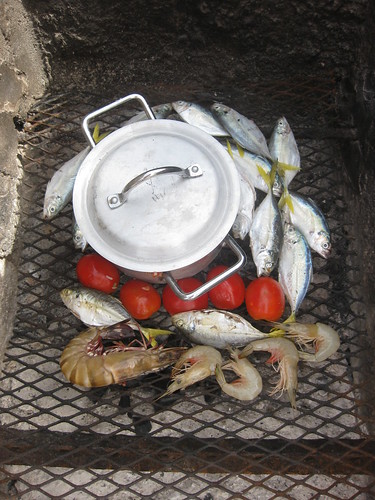
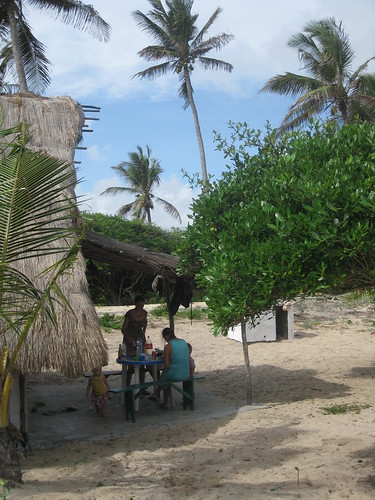
After stockings had been opened and a breakfast of bread and fresh lychees consumed, we were off to the beach again. This time the waves were not so big and the children had a great time running in and out of the sea and playing in the shallow pools which were as warm as a bath. As soon as the children (and possibly Brad and Ruth) went for a nap in the shade, Geoff and I set off up the beach to a fishing village to haggle for some fish we had just watched being brought in. We realised that this rundown ramshackle hamlet with its simple thatched houses was much closer to the reality of Jesus’ birth than the over-stylised, halo-clad, oxen filled nativity images we see so often.
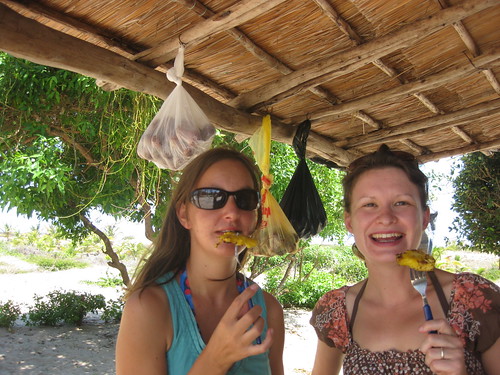 Soon it was time for our turkey (meaning the fish and prawns we’d just got from the fishermen cooked on the fire) and then back to Beira to Skype family. It was strange to be sitting in the sticky heat of our flat watching our families having the type of Christmas day we’re so familiar with, but it was great to feel just a small part of that world. As the children opened their presents from grandparents the day started to feel more familiar...
Soon it was time for our turkey (meaning the fish and prawns we’d just got from the fishermen cooked on the fire) and then back to Beira to Skype family. It was strange to be sitting in the sticky heat of our flat watching our families having the type of Christmas day we’re so familiar with, but it was great to feel just a small part of that world. As the children opened their presents from grandparents the day started to feel more familiar...
Subscribe to:
Posts (Atom)






